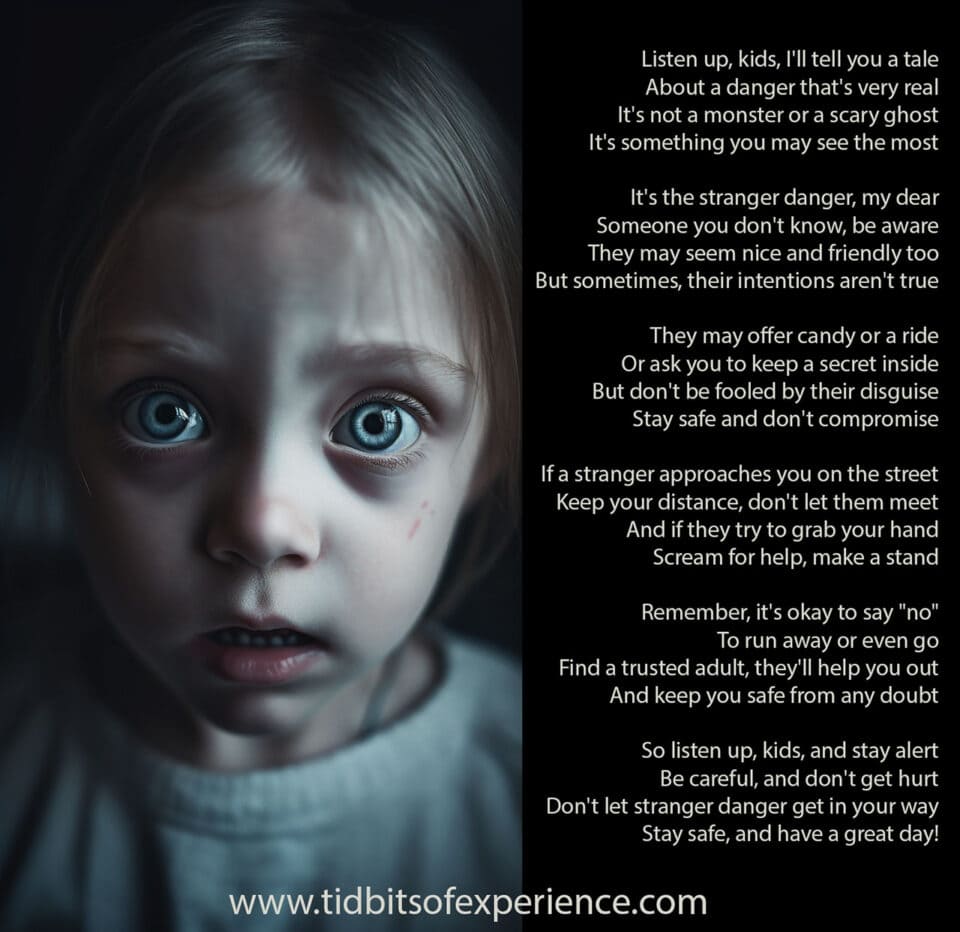The safety of our children is a top priority for every parent, so it’s essential to equip them with the knowledge and skills needed to navigate the world safely. Teaching stranger danger effectively helps protect your child from potential threats while promoting independence and confidence in their daily lives.
In this blog post, we’ll explore tips and strategies for teaching stranger danger, including age-appropriate lessons, identifying safe people and places, handling emergency situations, and fostering open communication within our families.
Key Takeaways (on Stranger Danger)
- Teaching children about stranger danger is essential to keep them safe, but it’s equally important to educate them on potential dangers from people they know.
- Parents should establish clear safety rules and guidelines for their family and regularly review them with their children while also role-playing different scenarios with them to build confidence and practical skills.
- Encouraging open communication and trust between parents and their children plays a crucial role in promoting safety behaviors while also utilizing technology like tracking devices or parental controls can serve as added safety measures.
Table of Contents
Understanding Stranger Danger

– Stranger danger refers to the potential harm that can be caused by strangers who may pose a threat to children’s safety.
Defining Stranger Danger
Stranger danger is a term used to describe the potential threats posed by individuals who are unfamiliar or unknown to your child. The concept emphasizes teaching children about the risks associated with interacting with strangers and reinforces the idea that not everyone has good intentions, even if they appear friendly.
Though it’s important for children to be cautious around people they don’t know, it’s crucial to acknowledge that most incidents involving child abuse or abduction involve someone known to them and their families.
It is also worth mentioning that focusing solely on “strangers” can sometimes divert attention from other dangers in our digital age, like online predators.
Degree Of Risk And Common Misconceptions
It’s essential for parents to understand the actual degree of risk and common misconceptions surrounding stranger danger.
One popular misconception is that online predators pose the greatest threat to our children’s safety. While it’s true that online safety is crucial, most unwanted solicitations come from other youth and young adults.rather than predatory strangers.
As we teach our kids how to stay safe around strangers, it’s crucial not to instill unnecessary fear in them. Overemphasizing the dangers posed by strangers can lead to increased anxiety and hinder children from safely exploring their environment.
At What Age Should Children Learn About Stranger Danger?

Introducing the concept of stranger danger to our children is essential in helping them stay safe. It’s never too early to start these important conversations, as kids as young as 3 or 4 years old can begin to understand basic safety rules and guidelines.
At this age, they are developing their social skills and independence but also might be more likely to trust unfamiliar people.
In teaching youngsters about stranger danger, use age-appropriate language that they can easily comprehend while emphasizing positive behaviors aimed at keeping them secure.
For example, instead of focusing solely on whom to avoid, teach them who the “safer strangers” are – such as uniformed police officers or trusted adults like teachers and neighbors – should they ever find themselves lost or feeling unsafe.
As your child grows older and engages increasingly in activities outside the home – such as attending school clubs or spending time with friends at local parks – revisit these discussions regularly while adapting guidance according to their maturity level.
Teaching Children About Stranger Danger
Teach children to identify safe people and places, recognize potentially dangerous situations, and communicate openly with trusted adults about any concerns they may have regarding strangers.
Identifying Safe People And Places
As a parent, one of the best ways to teach your children about stranger danger is to help them identify safe people and places. Here are some tips:
- Safer strangers: Gradually introduce your child to safer strangers such as police officers, shopkeepers with badges, and paramedics. Teach them that these people can help them if they feel unsafe or lost.
- Safer buildings: Identify public buildings like banks, post offices, and libraries to your child as safe places where they can seek help if needed.
- Trusted adults: Encourage your child to trust their instincts when it comes to identifying trusted adults in their life, like teachers, relatives, or family friends.
- Code words or signs: Establish a code word or sign with a trusted adult for when the child feels in danger.
- Communication: Encourage open communication with your child so that they feel comfortable telling you if they have been approached by a stranger or feel unsafe.
Remember that it’s important not only to educate your child about stranger danger but also potential dangers from people they know, such as family members or acquaintances. By teaching your child these strategies, you’ll be taking crucial steps toward ensuring their safety.
Recognizing Potentially Dangerous Situations
Children need to know how to recognize potentially dangerous situations, even if they involve people they know. Here are some signs that may indicate danger:
- Someone who repeatedly tries to get a child alone or insistently asks for their personal information.
- Someone who offers the child money, gifts, or treats in exchange for their time or attention.
- Someone who makes a child feel uncomfortable or scared by using language that is inappropriate or violent.
- Someone who seems too interested in the child’s life asks them questions about their family or personal habits.
- An adult asking a child to keep secrets from parents and other trusted adults.
- Anyone inviting the child to go somewhere privately, especially without permission from parents.
By teaching children these warning signs and empowering them with confidence and assertiveness, we can help prevent harmful incidents from occurring. Remember to encourage open communication with your children about their interactions and experiences so that they feel comfortable talking to you about any suspicious behavior.
The Importance Of Communication And Trust
As a parent, one of the most crucial aspects of keeping your children safe from potential danger is fostering open communication and trust. Encourage your child to talk with you about their day, any concerns they may have had, and anything that made them feel uncomfortable.
Active listening is key in building trust between yourself and your child.
Having good communication also means setting clear expectations for behavior and talking openly about safety rules with your child. Make sure they are aware of the basic stranger danger rules, such as never going off alone with strangers or accepting gifts from them.
It’s essential to stress that it’s okay for children to break these rules if they feel that they are in danger and need help.
In addition to being ready listeners, parents must be reliable sources of support for their children whenever needed.
Tips And Strategies For Keeping Your Children Safe
Establish family safety rules, such as never disclosing personal information or going anywhere without permission, and regularly review them with your children. Role-play scenarios with your children so they know what to do in dangerous situations, and encourage open communication so that they feel comfortable telling you about any potential threats.
Utilize technology for added safety measures like tracking devices or parental controls on electronic devices.
Establishing Family Safety Rules
As a parent, it’s important to set clear safety rules for your family. Here are some basic guidelines that can help protect your children:
- Always use the buddy system when leaving the house or going out in public.
- Never accept rides or gifts from strangers, even if they seem friendly or harmless.
- Have a designated safe place to go if your child feels threatened or scared, such as the home of a trusted neighbor or friend.
- Teach your children to speak up if they feel uncomfortable or unsafe around someone, and reassure them that it’s okay to say no.
- Monitor your child’s online activity and social media use, and teach them about internet safety and privacy.
- Make sure your child knows their full name, address, and phone number, as well as the contact information for trusted adults in case of emergency.
- Talk to your child about what to do in case of an emergency or natural disaster.
By establishing these rules with your family, you can help keep your children safe and empowered. Remember that communication and trust are key factors in promoting safety behaviors with children.
Role-playing Scenarios With Your Children
I highly recommend role-playing scenarios with your children to teach them about stranger danger and how to stay safe. It’s a fun and interactive way for children to learn practical skills that can help keep them safe in potentially dangerous situations.
One example of a scenario could be acting out what a child should do if they’re approached by a stranger while walking home from school. This can include teaching the importance of staying alert, recognizing warning signs, and knowing when it’s time to seek help from trusted adults or authorities.
Encouraging Open Communication
As parents, we all want our children to feel comfortable coming to us with any concerns or issues they may have. Encouraging open communication is essential in keeping our kids safe from harm.
To foster open communication, try having regular conversations about safety and checking in with your child often. Use language that is age-appropriate and engaging so that your child feels comfortable talking to you.
Share personal stories of times when you felt unsafe as a child, and ask them questions about their thoughts on different scenarios. Remind your child that it’s okay to say no if something doesn’t feel right, and praise them for speaking up about their feelings.
[Keywords: Open communication, fostering trust, regular conversations, sharing personal stories]
Utilizing Technology For Added Safety Measures
Using technology can be an effective way to add extra layers of safety for your children. One simple example is utilizing GPS tracking apps that allow you to monitor your child’s location and receive alerts if they leave a designated safe zone.
Additionally, there are resources available such as FBI fingerprinting services, child identification sheets, and DNA samples, that can help aid in the recovery of a missing child.
Social media platforms like Facebook have also implemented Amber alerts to quickly spread information about missing children in a specific area.
How To Handle A Stranger Danger Situation
Teaching your child what to do if they are approached by a stranger is important.
Steps For Children To Take If Approached By A Stranger
It’s important for children to know what to do if they are approached by a stranger, especially when they are alone or away from their trusted adults. Here are some steps that you can teach your child to take in such situations:
- Stay calm and alert: Teach your child to stay calm and be aware of their surroundings. Tell them to pay attention to the stranger’s appearance, clothing, vehicle, or any distinctive features.
- Keep a safe distance: Encourage your child to keep physical distance from the stranger and avoid getting too close.
- Say “No” firmly: Instruct your child to say “No” firmly if the stranger tries to engage them in conversation or offers them something.
- Run away: If the stranger persists or makes the child feel uncomfortable, tell your child to run away immediately and find a safe place with lots of people around.
- Seek help from a trusted adult: Teach your child to seek help from a trusted adult nearby, such as a uniformed police officer, teacher, coach, or shop assistant with a badge.
- Dial 911: Instruct your child how and when dialing 911 is appropriate in emergency situations only.
By teaching these steps, you empower your children with knowledge on how best they could protect themselves from an approach by strangers who may intend harm to them.
What To Do If Your Child Goes Missing
If your child goes missing, it’s important to act quickly and take the following steps:
- Contact the police immediately and provide them with a recent photo of your child, along with their physical description and any identifying marks or features.
- Search your home, yard, and surrounding areas for any sign of your child.
- Ask family members, friends, neighbors, and classmates if they’ve seen or heard anything concerning your child’s whereabouts.
- Check with local hospitals, homeless shelters, and mental health facilities in case your child may have sought refuge there.
- Contact the National Center for Missing and Exploited Children (NCMEC) at 1-800-THE-LOST (1-800-843-5678) to report your missing child and access additional resources.
- Share information about your missing child on social media platforms to reach a wider audience and increase awareness.
- Follow up regularly with law enforcement to ensure that they’re actively working on your case and providing you with updates as soon as possible.
Remember that time is of the essence when dealing with a missing child situation. Stay calm but act quickly to maximize the chances of locating your child safely.
The Importance Of Community Involvement
Collaborating with schools and local organizations is crucial in raising awareness about stranger danger and ensuring the safety of children in public spaces.
Collaborating With Schools And Local Organizations
Collaborating with schools and local organizations can help parents teach their children about safety and stranger danger. It is important to have a community-wide approach to keeping children safe, and the following tips can help:
- Contact your child’s school or local community center to see if they have any safety programs in place.
- Attend parent-teacher conferences and ask how personal safety is addressed in the classroom.
- Encourage your child’s school to invite guest speakers who can speak on personal safety topics such as abduction prevention, internet safety, and sexual abuse prevention.
- Volunteer at your child’s school or local community center and offer to help with these types of programs.
- Reach out to local law enforcement agencies and ask if they offer any resources or programs related to child safety.
- Work with other parents in your community to organize a workshop on personal safety for kids. You can invite experts from law enforcement agencies or nonprofit organizations.
Collaborating with schools and local organizations is an effective way of raising awareness about stranger danger. Parents should take advantage of these resources available within their communities.
Raising Awareness About Stranger Danger
It’s important to raise awareness about stranger danger beyond just teaching our own children. By collaborating with schools and local organizations, we can help spread important safety information and resources throughout our communities.
Additionally, by raising awareness about the risk of abuse by known persons, community members can be more vigilant in keeping an eye out for unusual behavior or signs of potential danger.
Frequently Asked Questions (About Stranger Danger)
What is stranger danger, and why is it important to teach kids about it?
Stranger danger refers to the potential threat posed by unknown individuals who may pose a risk of harm to children. It is important to teach kids about this concept so they can recognize dangerous situations and avoid them or ask for help from trusted adults.
What are some tips for teaching children about stranger danger?
Some effective strategies include role-playing scenarios with your child, teaching them how to identify safe people, establishing clear rules around interacting with strangers, and keeping open communication channels with your child so they feel comfortable telling you if something feels wrong.
How can I explain the concept of “tricky people” to my child?
The term “tricky people” refers to those who might not necessarily be strangers but could still pose a threat through manipulation or deceit. When explaining this concept to your child, make sure they understand that someone’s appearance or familiarity doesn’t automatically make them safe.
At what age should I start teaching my child about stranger danger?
It is recommended that parents begin discussing these topics as soon as their children are old enough to understand basic safety concepts (around 3-5 years old). However, ongoing conversations and reminders are necessary throughout childhood as new risks arise with age and development.
Conclusion
In conclusion, teaching our children about stranger danger is important to keep them safe from potential harm. It’s important to understand what stranger danger means and the degree of risk involved, as well as when children should begin learning about it.
We can teach our kids how to identify safe people and places, recognize potentially dangerous situations, and communicate with us openly. By establishing family safety rules, role-playing scenarios together, and utilizing technology for added measures, we can help protect our children.
In the event of a stranger danger situation, it’s essential that children know what steps to take while remembering that Safer Strangers are available in public spaces if needed.
